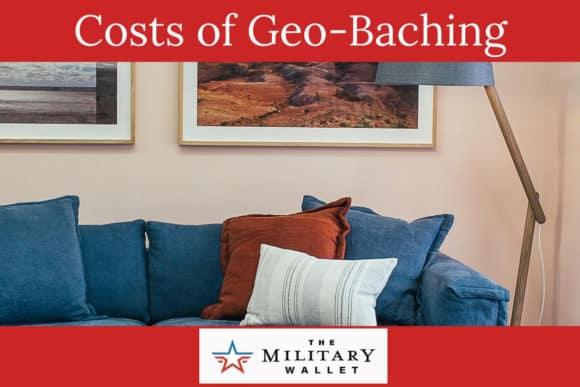Military families are accustomed to time spent away from their service members – from deployments to training, schools and TDY. It’s not unlikely you and your spouse will be separated for some time. So why would a military spouse ever volunteer to stay behind while a service member PCSs to a new installation?
There are many reasons why becoming a geographic military bachelor or bachelorette can be beneficial. But is geo-baching right for you?
What is Geo-baching?
Geo-baching is when a military family decides to separate, leaving the spouse and family in one location and the service member in another. When a service member decides to geo-bach, she/he receives BAH at the new duty installation, no matter which location has a higher BAH. It is important to note that geo-baching is not the same thing as receiving PCS orders to unaccompanied locations.
The DefenseTravel.mil website states:
“The policy decision to use duty location as a basis for BAH is based on the desire to compensate members for the typical housing cost near the member’s duty location. Once the duty station is known, the BAH compensation is fixed, regardless of where the member lives.”
This decision is intended to prevent service members and families from choosing their own locations based on the amount of BAH they would be eligible to collect. This might result in the majority to claim they are living in high-cost of living areas like California or Hawaii when they really live in more reasonably priced areas. Therefore, “the Services decided to base the allowance on the duty location with the full knowledge that members would still be free to live where they choose, but that this decision would not affect the BAH amount.”
To receive BAH for the old duty installation, a service member has to fill out a waiver form requesting an exemption.
These exemptions take into account the health and wellbeing of the family. Most often, exemptions are granted relating to access to medical care. Another common exemption is when a service member is assigned to a position where they’re technically PCS’d to a new location but will be forward deployed or spending a lot of time at an alternate location.
Each military branch establishes budgets to support a certain number of service members and families at duty installations. These budgets could be skewed if families en masse decided to stay in old installations, which is why the military doesn’t encourage geo-baching. The other reason relates to the fundamental philosophy embedded in military culture – service members and families create better work environments and esprit de corps when they’re active participants in local installations.
Note: Geo-baching, or voluntarily living in separate locations, is different from being on unaccompanied orders. Unaccompanied orders are when the military does not allow the service member to bring his or her family to their next duty assignment, generally because of the nature of the orders, such as the location, a short tour length, medical clearance or similar reasons.
Because unaccompanied orders are at the decision or convenience of the military, the service member will receive military quarters at his or her new location and the family in the separate location will receive BAH for that location.
Why Do People Geo-bach?
Every family’s situation is different, so there are always different circumstances that lead to a decision to be voluntarily separated for a while. Some of those reasons include:
- Allow children to complete school.
- Allow military spouses to pursue their careers in a specific location.
- If a service member’s assignment is less than one year, a family might decide to stay put instead of having to PCS several times.
- Couples who have used VA loans to purchase a house need to occupy the residence for at least one year before moving out. Geo-baching allows this to happen, especially if the purchase came right before orders were issued to move.
- OCONUS PCSs can be difficult for families with small children. Sometimes it makes more sense for the spouse and family to remain in a stateside location instead of moving abroad.
- Exceptional Family Member Program (EFMP) families may opt-out of a move to continue receiving care or education at their current installation.
What is the Official Process?
The official process begins at the unit level once orders are issued. The service member will need to fill out a form requesting geo-bach status. Once the command request has been processed, the soon-to-be geo-bachelor(ette) will have to have his/her orders updated and should begin exploring housing options at the gaining installation.
What are My Financial Considerations?
Geo-baching involves lots of moving parts, so it’s important to thoroughly and carefully weigh the financial considerations. In addition to the cost of maintaining two households, there are also unexpected expenses that arise from living separately. There’s also the cost of finding temporary furniture, plus the cost of insurance in two different locations.
When a family chooses to voluntarily separate, the military does not provide any additional funding to offset two households’ costs.
Some installations will offer “bach-quarters,” which are old barracks or motel rooms, but these depend on the space available at the installation and aren’t guaranteed. Several years ago, all branches of the military stopped offering free barracks space to service members living apart from their families. Currently, most separated service members need to pay for lodging, and rates vary depending on the installation.
What are the Drawbacks to Geo-Baching?
Generally speaking, geo-baching is more expensive than when a family/couple stays together at the same installation. That’s because the costs for living double – one at the former installation and one at the new gaining installation. There are also the additional costs of travel for visits, not to mention food, utilities and other expenses.
Of course, geo-baching is rarely a purely economical choice, and it’s one that isn’t entered into lightly. There are times when it feels like the best course of action for a military family, so it’s important to understand the entire process before making that decision.




About the comments on this site:
These responses are not provided or commissioned by the bank advertiser. Responses have not been reviewed, approved or otherwise endorsed by the bank advertiser. It is not the bank advertiser’s responsibility to ensure all posts and/or questions are answered.